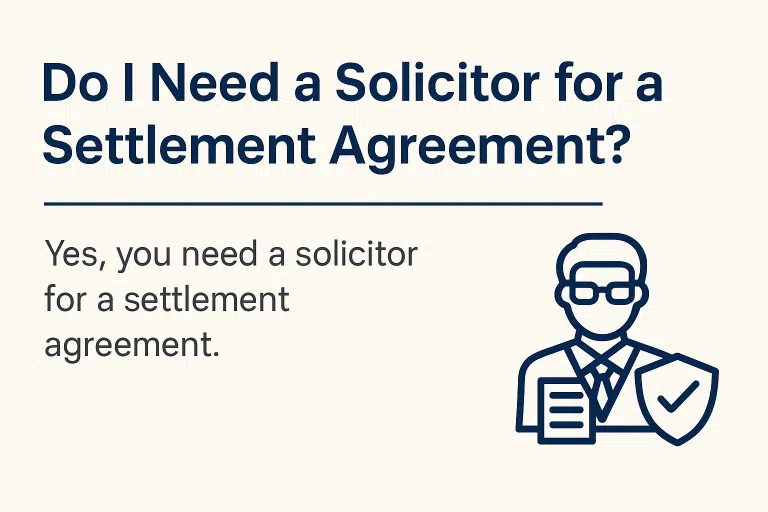Do I Need a Solicitor for a Settlement Agreement?
When facing the end of your employment, your employer might offer you a settlement agreement — a legally binding contract that sets out the terms of your departure. But one of the most common questions employees ask is: “Do I need a solicitor for a settlement agreement?”
The short answer is yes — and in most cases, you are legally required to take independent legal advice from a qualified solicitor before signing. Let’s explain why.
This safeguard protects employees from being pressured into waiving their rights without knowing the consequences.
Contact Us Today!
Please fill in the form and we will get back to you within 24 hours.

What Is a Settlement Agreement?
A settlement agreement (previously known as a compromise agreement) is a contract between an employer and an employee that formally ends employment on agreed terms.
Typically, it includes:
A final payment or compensation for loss of employment
A waiver of legal rights to bring future claims against the employer
Confidentiality clauses
Non-disparagement clauses preventing negative comments about the employer
Once signed, both parties are bound by the terms — so it’s crucial that you fully understand what you’re agreeing to.
Contact Us Today!
Please fill in the form and we will get back to you within 24 hours.
Why You Need a Solicitor for a Settlement Agreement
1. It’s a Legal Requirement
For a settlement agreement to be valid under UK employment law, the employee must receive independent legal advice from a solicitor, trade union representative, or certified adviser.
Without this legal advice, the agreement has no legal effect, and your employer could still face potential claims.
2. Ensures You Get a Fair Deal
Employers often draft settlement agreements in their own favour. A solicitor can:
Review the compensation amount and negotiate a better settlement
Check if the notice pay, bonuses, and holiday pay are correctly included
Identify unfair clauses, such as excessive restrictions or confidentiality terms
A good employment solicitor ensures that the agreement is fair and that you’re not losing valuable rights or payments.
3. Clarifies Complex Legal Language
Settlement agreements are written in legal terminology that can be difficult to interpret.
Your solicitor will:
Explain your rights in plain English
Highlight any potential risks
Make sure you fully understand what you’re signing
This helps avoid misunderstandings and protects you from future disputes.
4. Your Employer Usually Pays the Legal Fees
In most cases, your employer will contribute to your legal costs, typically between £350 and £750 + VAT.
This means you can access expert legal advice at little or no personal cost.
Get a Free Settlement Estimate – See What You Could Be Owed
What Happens During the Process
Here’s what usually happens when you receive a settlement agreement:
You receive the draft agreement from your employer.
You consult a solicitor specialising in employment law.
The solicitor reviews and explains the terms.
If needed, they negotiate better terms on your behalf.
Once you’re satisfied, both parties sign the agreement.
What If I Don’t Use a Solicitor?
If you sign without independent legal advice, the agreement will not be legally binding, and you’ll still be free to pursue claims in an Employment Tribunal.
However, your employer will likely refuse to process any settlement payment until you’ve had the agreement reviewed by a solicitor — so skipping legal advice is not a practical option.
Final Thoughts
In summary, you do need a solicitor for a settlement agreement — not only because it’s a legal requirement, but also because it protects your rights, ensures fairness, and gives you peace of mind.
Before signing, always seek professional advice from a specialist employment solicitor who can explain your options and negotiate the best possible outcome.
Contact Us Today!
EXCELLENT





